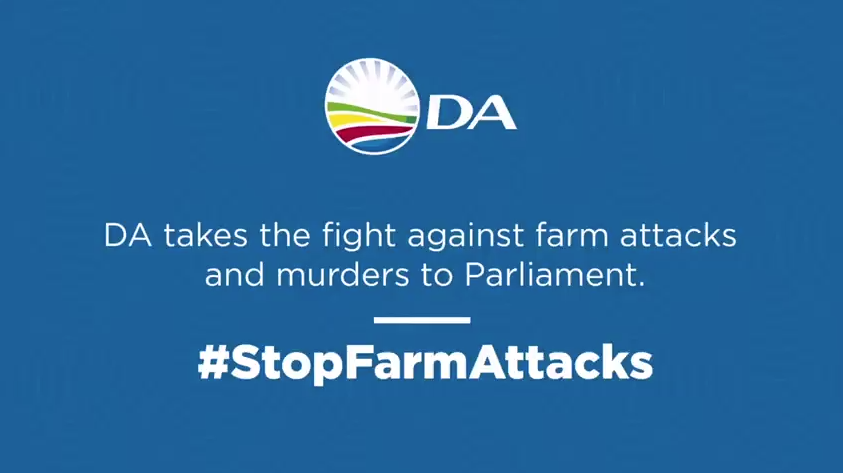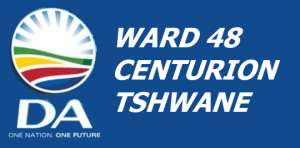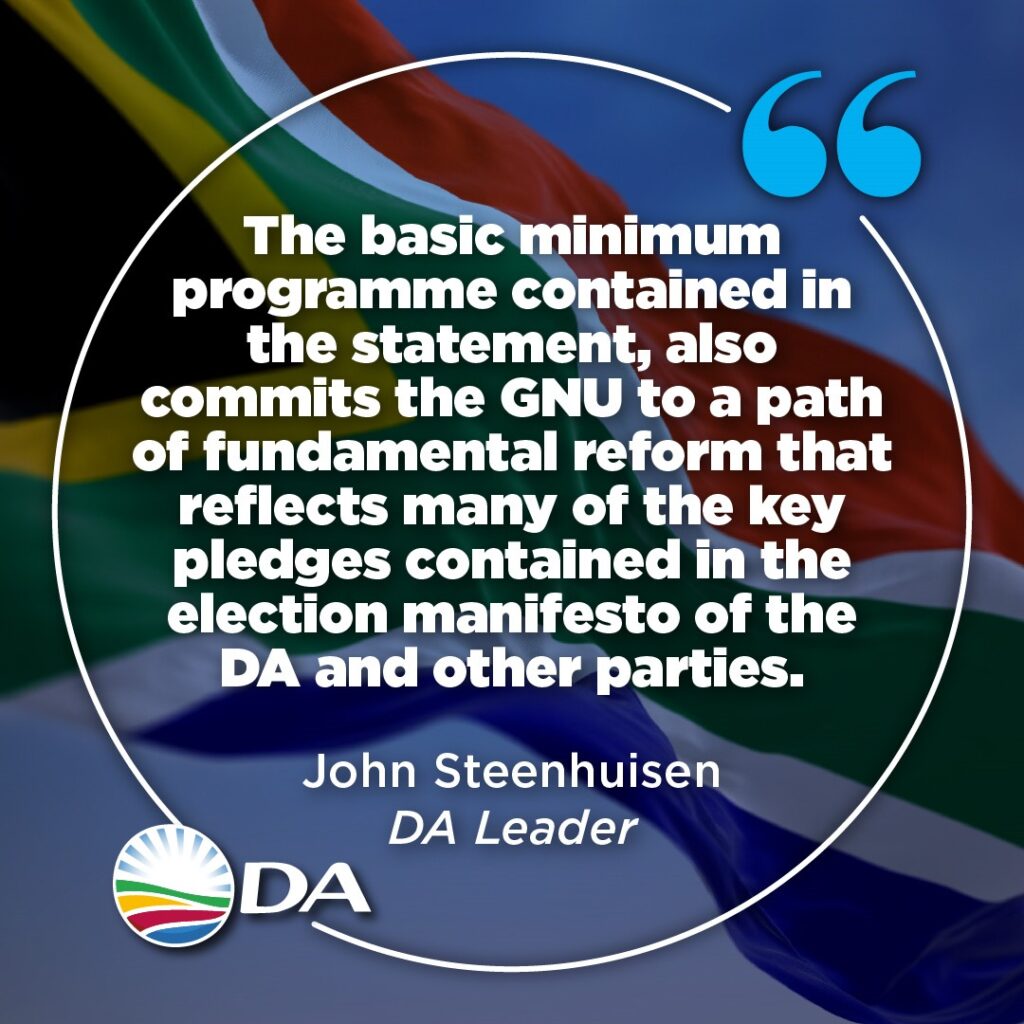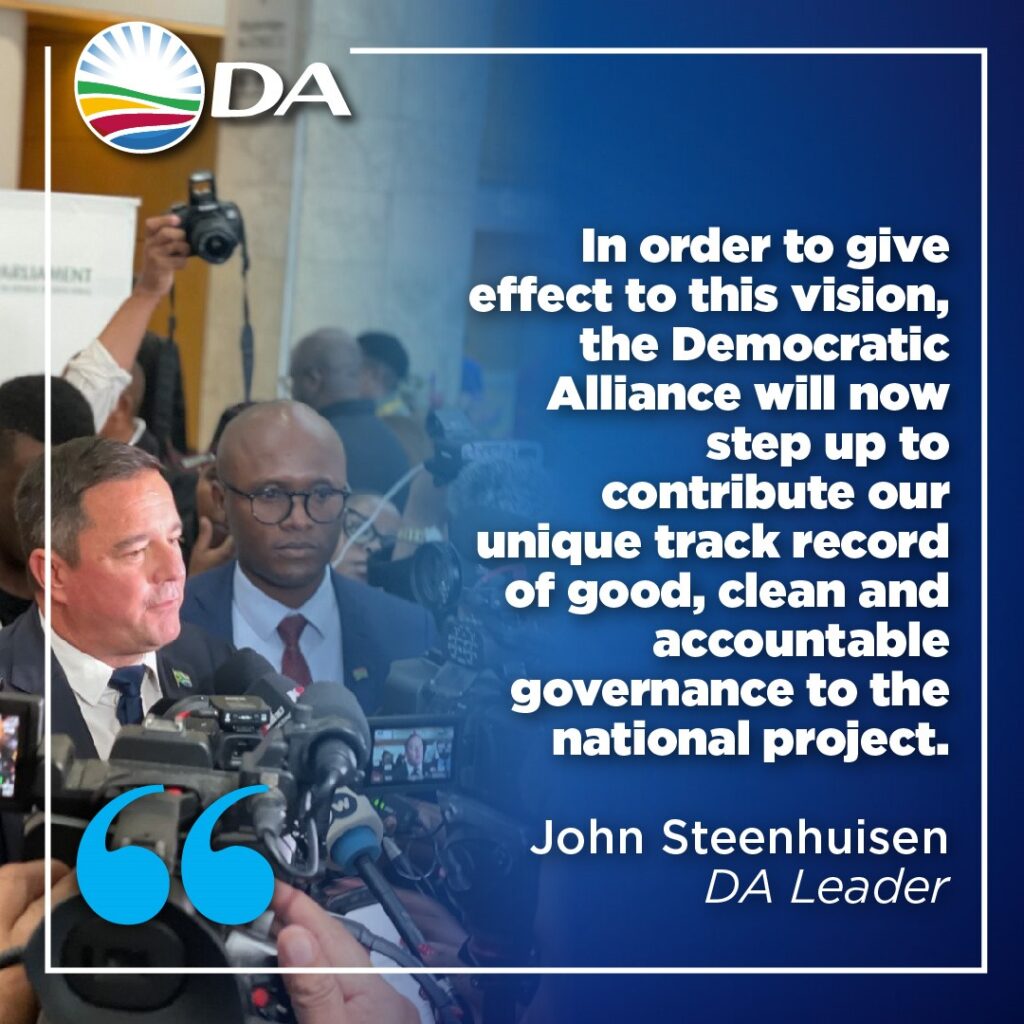Land Reform
Mmusi Maimane MP,
Leader of the Democratic Alliance,
Thandeka Mbabama MP,
DA Shadow Minister of Rural Developmen and Land Reform,
&
Ken Robertson MP,
DA Shadow Deputy Minister of Rural Development and Land Reform,
Constitutional Hill, 12 March 2018
“We need a change in government, not a change to the Constitution”
Introduction
One cannot begin to consider South Africa’s history without grappling with the skewed patterns of ownership of, and access to, land that has unfolded over the past almost four centuries. For the majority of South Africans, this is a deeply emotive matter, the pain and suffering of which goes to the very heart of why it is a justice issue that requires just solutions.
Active dispossession, and barriers to possession, of land for black South Africans has left the country with a pattern of land ownership that excludes black South Africans. This was to be expected when considering the deliberate nature of this state action. This is most aptly illustrated by the enforcement of the 1913 Land Act – apartheid’s “original sin”. This piece of legislation was a double hammer blow to the majority of South Africans. It not only denied black land ownership outside of the “native reserves”, but set up an inherently unfair migrant labour system, which saw black South Africans living far away from jobs, and opportunity. Therefore, this matter is not just about land, but also location. Many black South Africans still find themselves living very far away from economic opportunity – which limits their ability to find work, and improve the lives of themselves and their loved ones. This remains part of the painful legacy we must address, collectively.
While we cannot turn back the clock and avoid this injustice, we can take constructive and deliberate action to meaningfully address it in line with the spirit and purports of our Constitution. Any person who calls South Africa their home, and cares for the future of this nation, must be incensed by this injustice, and by extension welcome reasonable, rational, and Constitutional measures to ensure justice is served.
The Democratic Alliance (DA) fully supports the Constitutional injunction to restitute land and reform the still-skewed patterns of land ownership as currently reflected in our Constitution. As a party of and for the Constitution, we not only support, but implement section 25 of the Constitution where we are able to in DA-run governments. This point cannot be emphasised enough: The DA supports, and implements, land reform.
We are fully committed to land restitution and reform as a means for undoing the terrible trauma of dispossession, and building a strong, thriving and diverse economy – both rural and urban. We see nothing wrong with the current provisions of the Constitution, but rather the lack of action by government over the past 24 years to ensure justice is served and land ownership patterns are addressed.
We thus argue that it is the ANC government’s inefficiency – and not the Constitution – that has failed to address this injustice. What we need is a change in government, not a change to the Constitution.
- 1. President Ramaphosa on land
During his maiden State of the Nation Address (SONA) in February 2018, President Ramaphosa said that:
‘Guided by the resolutions of the 54th national conference of the governing party, this approach will include the expropriation of land without compensation… Government will therefore undertake a process of consultation to determine the modalities of the implementation of this resolution. We make a special call on financial institutions to become our partners in mobilising resources to accelerate the land redistribution programme, as increased investment will be required as we generate more growth in agriculture and treat the sector as a job creator and a sunrise sector of the economy.’
The President spoke to no plan of how the government intended to expropriate land without compensation. A process of consultation appeared satisfactory for the President – a plan to make a plan.
Then the next week in his Reply to the Debate on the State of the Nation Address, President Ramaphosa said that:
‘We need to interrogate the statement that the expropriation of land without compensation is incompatible with a growing, flourishing economy. We need to respond to the view that what we propose represents a violation of the spirit and intent of our democratic Constitution… we will need to locate this measure within a broad and comprehensive land redistribution and agricultural development programme.’
He made no mention of how expropriation of land without compensation is compatible with economic growth, why the proposal is not a violation of the spirit and purport of the Constitution or what said land redistribution and agricultural development programme would entail. Simply more unsubstantiated platitudes, and more plans to make plans.
And then most recently in his address to the House of Traditional Leaders, President Ramaphosa said that:
‘The programme of land reform must have clear targets and timeframes, be guided by sound legal and economic principles, and must contribute to the country’s overall job creation and investment objectives. By providing more land to more producers for cultivation, and by providing the necessary support, we are laying the foundation for an agricultural revolution. We are determined to work with traditional leaders to significantly expand agriculture, not only to ensure food security, but also to create jobs on a significant scale and increase the value of our exports.’
What these targets, timeframes, legal and economic principles are, what he means by an agricultural revolution, how the government planned to collaborate with traditional leaders and what role they are meant to play in economic growth he also did not specify.
In a handful of addresses over the past month, not once did President Ramaphosa mention in detail what the government’s plan is to expropriate land without compensation.
It is unacceptable for the president to support a radical – and unnecessary – change in the Constitution, which has the potential to cause profound economic harm, yet fails to give any indication as to how this will be implemented and what the effects will be.
Which begs the question as to whether there really is a plan or just more plans to make plans.
Which is exactly what I will be asking President Ramaphosa in oral question session in the National Assembly on Wednesday: what are the exact details of the government’s plans to expropriate land without compensation?
- 2. Defense of section 25 of the Constitution
While President Ramaphosa would have one believe that expropriation of land without compensation does not represent a violation of the spirit and intent of the Constitution, this is what section 25(2)(a) read with section 25(3) of the Constitution reads:
‘(2) Property may be expropriated only in terms of law of general application – (a) for a public purpose or in the public interest; and
(3) The amount of the compensation and the time and manner of payment must be just and equitable, reflecting an equitable balance between the public interest and the interests of those affected, having regard to all relevant circumstances’
However, nothing in the architecture of our constitution stands in the way of substantive land reform. President Ramaphosa’s contention is rendered moot by former Deputy Chief Justice, Dikgang Moseneke’s Keynote Address that he delivered on 12 November 2014 at the ’20 Years of South African Democracy – So Where to Now’ conference at the University of South Africa entitled ‘Reflections on South African Constitutional Democracy – Transition and Transformation.’ Moseneke J said that:
‘In 20 years our Court has not resolved even one case of land expropriation under the property clause by government for a public purpose. Similarly, in the same time the courts have never been called upon to give meaning to the property clause in the context of land expropriation or to decide on what is a just and equitable compensation. One would have expected that a matter so pressing as land use, occupation or ownership would pre-dominate the list of disputes in the post-conflict contestation.’
Ramaphosa’s comments are also rendered moot by the findings of the High Level Panel on the Assessment of Key Legislation and the Acceleration of Fundamental Change, chaired by Former President Kgalema Motlanthe, which released its report less than four months ago. It stated as follows:
‘The Panel is of the view that government has not used the powers it already has to expropriate land for land reform purposes effectively, nor used the provisions in the Constitution that allow compensation to be below market value in particular circumstances. Rather than recommend that the Constitution be changed, the Panel recommends that government should use its expropriation powers more boldly, in ways that test the meaning of the compensation provisions in Section 25 (3), particularly in relation to land that is unutilised or underutilised. The lack of well-situated land for urban settlement remains a stark legacy of apartheid planning and discrimination. Well-situated state-owned land needs to be made available for housing for the poor, and well-situated privately owned land targeted for expropriation.’
The Panel found that there exists no fault with the Constitution as is, and found that ‘evidence of corruption by officials, the diversion of the land reform budget to elites, lack of political will, and lack of training and capacity’ were the major stumbling blocks to effective land reform in South Africa.
A clear example of this is the inexcusable incapacity issues at the Land Claims Commission. At the present rate of finalisation of 560 claims a year, it will take 35 years to process all old order claims, as currently there are 7 000 unsettled and more than 19 000 unfinalised “old older” claims. This is not a constitutional problem, but a political one.
The implications of tampering with Section 25 go beyond agricultural land. Downgrading property rights also means downgrading the title deeds given to these thousands of black South Africans. Many of these first-generation property owners had to wait two decades for lawful title to their homes. These properties give people access to bank loans, and assets to pass along to their children. Tampering with the ideal of private ownership is not only a threat to famers, it is a threat to South Africans who have just started to overcome the legacy of Apartheid.
The government would in effect revoke millions of title deeds, as well as remove ownership of farms from black South Africans. Between 1994 and 2013, 4 813 farms were transferred to black South Africans through redistribution programmes at a cost of R12.9 billion of public money. These farmers would lose ownership of those farms – and all the economic benefits which come with ownership .
The ANC and the EFF want their friends to be landlords, and all South Africans to be landless. Their policy is divisive and the only unifying thing about their plan is how all South Africans will be in the same boat: landless and at the mercy of the state. This is not progress, this is us going backwards.
Therefore, no arbitrary deprivation of property and no Constitutional amendment is required for land reform to occur meaningfully. This has become a convenient ‘get out of jail free’ card for the ANC, and gives them the perfect cover to avoid having to explain their rank failure over two decades to take land reform seriously.
- 3. Rejection of expropriation of land without compensation
The DA fundamentally disagrees with the ANC position to expropriate land without compensation, because no Constitutional amendment is therefore necessary for substantive land reform. This would take away value and ownership from all – black and white.
Current ANC policy, shared by the EFF, is that the state should be the custodian of all land.
This means that no black people would be able to own land as beneficiaries of land reform. This state- owned land would be parcelled out with short and medium term leases, seeing to it that black South Africans are dependents on government – and not free to own their own land.
This is a patronising, insulting policy that shows that the ANC and the EFF do not trust black South Africans enough to actually give them full ownership. It is their intention to turn black South Africans into permanent tenants of the state, with all of the opportunities for patronage and corruption that comes with that approach.
This is not empowerment, but enslavement. However, there is an alternative.
Where the DA is in government, despite the constraints and limited scope of local and provincial government, we are addressing this issue. The aggressive expansion of affordable housing projects in Central Business Districts (CBDs), the rapid delivery of title deeds, share equity schemes and land reform projects in the Western Cape are but a few examples. In national government, the DA would have the legal and Constitutional mandate to do what the current government has failed to do over the past 24 years. We would ensure that justice is served, and previously disadvantaged South Africans become owners of land, not permanent serfs dependent on the government.
The DA-run Western Cape far exceeds the rest of the country in implementing land reform. These share equity schemes are arrangements in which farm workers, small-scale farmers or other disadvantaged
people buy shares in a commercial farm or an agricultural processing company through government grants and become co-owners with the original owners. This model has been successfully implemented in approximately 90 farms in the Western Cape.
The Western Cape’s land reform audit found that the provincial government’s pioneering Commodity Approach and innovative solutions like the share equity schemes has led to the success of 62% of all land reform farms in the Western Cape. The national government’s failure rate of land reform projects is currently standing at 92%.
Land restitution figures recently released by the Commission on the Restitution of Land Rights (CRLR’s) in their annual report, shows that the Western Cape has the country’s highest number of settled land claims, in total, 194 claims to the value of R1.5 billion.
The Western Cape has also increased its budget to our implementation agency, Casidra (Cape Agency for Sustainable Integrated Development in Rural Areas) by almost 44% in order to speed up land reform across the agricultural sector
We are not only focused on rural land reform. We are the only party in South Africa that has focused on reforming ownership of urban land by making sure that beneficiaries of state subsidised housing have full ownership title to those homes. We have made 75 000 home owners already, and are distributing more title deeds every day we are in government.
Thousands of social housing units have been approved in the City of Cape Town which will see the spatial legacy of land dispossession addressed.
There are no simple solutions to this very complex matter. There is no “restart button” – no matter how attractive that may be to some. We cannot correct the original sin by committing another sin.
There is no Constitutional failure, but there most certainly is a governance failure. We cannot now give the government more power to fail us again.
This does not mean that we are against land reform. We are committed to real empowerment and ownership, not enslavement.
The DA will always fight for individual property rights, and freedom from the changing whims of a state with too much power. That is what South Africans truly want.
- 4. Land policy proposals
4.1. Introduction
While President Ramaphosa has been making plans to make plans, the DA has sound policy proposals on land. Because it is a fact that most black South Africans in rural and urban areas would rather own land than only have the right to use land that they do not own. And herein this lies the clear blue water between the DA and the ANC. The DA believes that government must work to protect the rights and agency of individuals while the ANC contends that government is a custodian of individuals’ agency.
While the Department of Rural Development and Land Reform said that as at 2012, 7.95 million hectares had been redistributed to black people, the Department’s official November 2017 land audit report reflected that black South Africans only own 1.5 million hectares of land. That is a 6.45 million hectare difference between what the Department say they have redistributed and what they have actually redistributed.
This discrepancy arises because:
1) Land restitution beneficiaries often choose to receive financial compensation in lieu of actually taking ownership of land, as is their right; and
2) Importantly, because the state owns thousands of farms (over 4 300) which it counts as having been redistributed, but which in fact it only leases to black farmers, with little security.
It is this latter approach which shows how the ANC simply does not trust black South Africans to own land. This is deeply concerning and insulting, particularly in light of the fact that black South Africans own twenty times less land than white South Africans.
4.2. Policy proposals
Under a DA government, we will achieve meaningful redress for the legacy of land dispossession by giving far more black South Africans the opportunity to be owners of both agricultural and urban land.
New recipients of state subsidised housing will receive full title, and past recipients of RDP homes will given full title.
We will make it cheaper for first time buyers to purchase homes through the lowering of transfer costs. We will distribute the thousands of government owned farms and fallow land, instead of treating emerging farmers as permanent tenants.
We will give residents of tribal land security of tenure that is recorded and legally enforceable.
We will allocate adequate budgets to settle all remaining land restitution claims, and for land reform purposes, on the basis of the Constitutional guidelines for compensation.
Anyone who wants to farm will receive the support they need to be successful, through the transference of skills and by providing access to the resources and markets they need to sell their goods.
All of this is attainable without amending the Constitution.
Additional detail:
4.2.1 Urban land reform
- Speed up the expansion of housing opportunities by providing serviced plots close to urban centres;
- Increase security of tenure in informal areas by amending Section 10 of the Housing Act (Act 107 of 1997) which concerns restrictions on the voluntary sale of state-subsidised housing. The current probationary period of eight years will be reduced to two;
- Abolish transfer duties on land transfers for all first time, owner-occupied residential purchases under R2 million, as well as for purchases by over 65-year-olds;
- Introduce a subsidy programme aimed at the low-income “gap” housing market to assist those who do not qualify for RDP housing in gaining access to bank loans;
- Making state land available for urban densification;
- Expanding and improving the management of commonages in semi-urban areas which are used by the urban poor to supplement their incomes; and
- Ensuring that land identification for land transfers (for both agricultural and non-agricultural purchases) form part of an integrated system of spatial development planning – which takes into account the need to preserve high-value agricultural land for productive purposes.
4.2.2 Rural land reform
- Joint ventures: Partnerships between established and emerging farmers aimed at matching new farmers with access to land with skilled and experienced agri-business practitioners;
- Co-operatives: Collaborative relationships between farmers, inclusive of new entrants, that could help them to (i) share expensive capital equipment, (ii) pool skills, (iii) pool resources to establish marketing opportunities for their products, and (iv) boost their bargaining power in both procurement and marketing;
- Contract farming: Land reform beneficiaries can generate significant income from their land by allowing other farmers or firms to use their land on a contract basis; and
- Farm equity schemes: These schemes allow the complex business models that modern commercial farming requires to be competitive to be maintained while diversifying ownership and promoting economic inclusion. Around 90% of equity schemes in the Western Cape are deemed to be successful.
4.2.3 Department of Rural Development and Land Reform turnaround strategy
- Conduct a full audit of capacity and skills shortages in national and provincial departments of Agriculture, Rural Development and Land Reform;
- Urgently fill vacancies in the Department of Rural Development and Land Reform with skilled professionals with a passion for rural development and improving the pipeline of appropriately skilled employees by investing in agricultural training;
- Improve inter-departmental integration to improve service delivery to established and emerging farmers, for example: telecommunications access, transport infrastructure and access to small business development programmes;
- Set up a dedicated national budget for the provision of infrastructure and services in land reform areas;
- Use private sector assistance in identifying and acquiring land and, where possible, limiting the role of the Department to specifying land requirements and regulating acquisition efforts. The state would still play a role in identifying smaller parcels of land to meet the needs of beneficiaries who want to supplement their incomes through small-scale farming;
- Simplify requirements around the sub-division of agricultural land to accommodate small-scale farmers without compromising commercial food production;
- Make effective use of technology in managing land restitution claims and land redistribution transactions in an integrated manner, with key information being made accessible to those involved in specific transactions; and
- Identify the high value inputs that government can make and develop the capacity within the department to make such inputs.
Conclusion
South Africans want to launch businesses and/or work land that they could own for subsistence and/or commercial farming. They do not want to have to rely on the discretion of the state for their property rights.
South Africans would rather be free and agents of their own fate on land that is their own.
The DA is their champion. We are the party that will champion their right and their aspirations to own property.
The DA will always be for land reform which addresses the injustices of our past, and truly empowers black South Africans.
Our goal is to give land to people, and not to the government. Herein will always lie the clear blue water between the DA’s policy proposals on land and that of the ANC and the EFF.
















